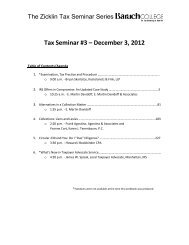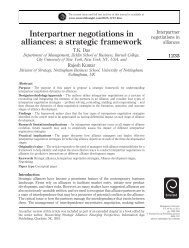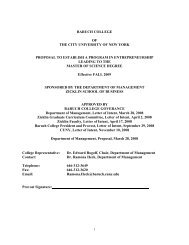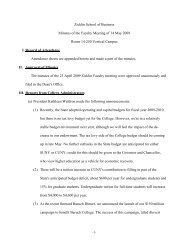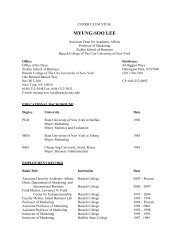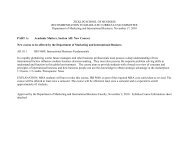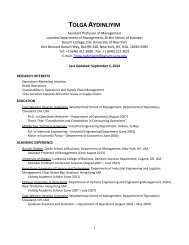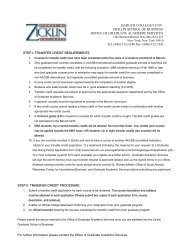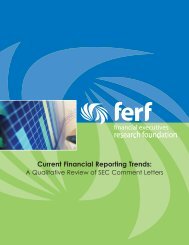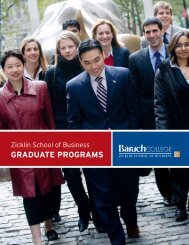All virtue is summed up in dealing justly - Aristotle
Untitled - Zicklin School of Business
Untitled - Zicklin School of Business
- No tags were found...
Create successful ePaper yourself
Turn your PDF publications into a flip-book with our unique Google optimized e-Paper software.
<strong>All</strong> <strong>virtue</strong> <strong>is</strong> <strong>summed</strong> <strong>up</strong> <strong>in</strong> deal<strong>in</strong>g <strong>justly</strong>. - Ar<strong>is</strong>totle<br />
• Trust <strong>is</strong> the foundation of development both <strong>in</strong> relations<br />
among humans and <strong>in</strong>stitutions<br />
• Ga<strong>in</strong><strong>in</strong>g the trust of others <strong>is</strong> a valuable but difficult endeavor<br />
• Achiev<strong>in</strong>g the status of be<strong>in</strong>g trustworthy <strong>is</strong> a long process,<br />
but trust could be lost very quickly<br />
• In ga<strong>in</strong><strong>in</strong>g trust, actions speak louder than words, as<br />
cons<strong>is</strong>tency of actions <strong>is</strong> a more dependable <strong>in</strong>dicator of<br />
<strong>in</strong>tent<br />
• Corporate governance <strong>is</strong> the foundation of corporate trust<br />
• The most important element of organizational <strong>in</strong>frastructure <strong>is</strong><br />
the Board of Directors<br />
• The boards do not run companies but rather guide and<br />
adv<strong>is</strong>e the management<br />
• Governance <strong>is</strong> much more than compliance.<br />
Good corporate governance<br />
<strong>is</strong> a culture and a climate of;<br />
ons<strong>is</strong>tency,<br />
esponsibility,<br />
ccountability,<br />
airness,<br />
ransparency and<br />
ffectiveness that <strong>is</strong><br />
eployed throughout<br />
the organization.
The quality of a board depends on the quality of its members, its<br />
structure, and its processes.<br />
PEOPLE TEAM PROCESS CULTURE INFORMATION GUIDANCE OVERSIGHT<br />
Structure<br />
Internal Processes<br />
Responsibilities<br />
P T PR C I G O
Independent members should be competent and sufficiently<br />
<strong>in</strong>formed to make judgments for susta<strong>in</strong>ability of the company.<br />
Role of Independent Board Members<br />
Components of Independence (*)<br />
• Handle ‘the agency problem’<br />
between the shareholders and<br />
the management (fraud,<br />
crony<strong>is</strong>m, lethargy, r<strong>is</strong>k<br />
aversion, r<strong>is</strong>k prone)<br />
• Evaluation of the r<strong>is</strong>k-reward<br />
balance, short term – long term<br />
returns, stakeholder <strong>in</strong>terests,<br />
ethical conduct – market<br />
realities, oversight - motivat<strong>in</strong>g.<br />
• Prevention of preferential<br />
treatment of any stakeholder.<br />
• F<strong>in</strong>ancial: Corporate<br />
governance codes mostly<br />
def<strong>in</strong>e <strong>in</strong>dependence <strong>in</strong> terms<br />
of the f<strong>in</strong>ancial <strong>in</strong>terest of the<br />
member<br />
• Intellectual<br />
• Political<br />
• Gro<strong>up</strong> Independence<br />
• Emotional<br />
(*) Independence argument should not be carried too far to elim<strong>in</strong>ate qualified candidates who may<br />
serve the corporation well and go for people who do not have relevant experience.<br />
P T PR C I G O
The key to a successfully function<strong>in</strong>g board <strong>is</strong> the character and<br />
competencies of the people who make <strong>up</strong> that board.<br />
General<br />
Character<strong>is</strong>tics<br />
of Board<br />
Members<br />
Individual<br />
Competencies<br />
of Board<br />
Members<br />
1. Integrity and high ethical standards,<br />
2. Understand<strong>in</strong>g of fiduciary responsibility,<br />
3. F<strong>in</strong>ancial literacy,<br />
4. Conformity with the corporation’s values,<br />
5. Ability to make judgments on dec<strong>is</strong>ions with<br />
implications on numerous dimensions,<br />
6. Independent th<strong>in</strong>k<strong>in</strong>g, ability to express thoughts,<br />
7. Exhibit<strong>in</strong>g a constructive approach,<br />
8. Hav<strong>in</strong>g <strong>in</strong>ternalized the pr<strong>in</strong>ciples of corporate<br />
governance,<br />
9. Believ<strong>in</strong>g <strong>in</strong> and apply<strong>in</strong>g standards of stretch<br />
performance,<br />
10.Be<strong>in</strong>g prepared to devote sufficient time and attention,<br />
11.Will<strong>in</strong>g to take <strong>in</strong>itiative to be proactive, challenge the<br />
management, and when needed take action.<br />
1. Sector experience<br />
2. Stakeholder experience<br />
3. Senior management experience<br />
4. Senior-level relationships<br />
5. Geographic or <strong>is</strong>sue based experience<br />
The basic<br />
member<br />
choos<strong>in</strong>g<br />
criterion “What<br />
value they will<br />
add to the<br />
board.”<br />
P T PR C I G O
Board members should demonstrate certa<strong>in</strong> behaviors <strong>in</strong> fulfill<strong>in</strong>g<br />
their duties.<br />
1. Know<strong>in</strong>g the corporation and the market well<br />
2. Implement<strong>in</strong>g a challeng<strong>in</strong>g and constructive question<strong>in</strong>g process<br />
3. Hav<strong>in</strong>g a good understand<strong>in</strong>g of the corporation’s cash flow<br />
4. Hav<strong>in</strong>g an understand<strong>in</strong>g of benchmarks<br />
5. Focus<strong>in</strong>g not only on the performance of the current term, but also about the<br />
<strong>in</strong>dicators for the future performance<br />
6. Inorganic growth opportunities<br />
7. Succession plann<strong>in</strong>g<br />
8. Potential off-balance-sheet liabilities<br />
9. Reputational r<strong>is</strong>ks, wh<strong>is</strong>tle blow<strong>in</strong>g process <strong>in</strong> identify<strong>in</strong>g potential fraud r<strong>is</strong>ks<br />
10. Understand<strong>in</strong>g customer expectations<br />
11. Understand<strong>in</strong>g of the value cha<strong>in</strong><br />
12. Effective oversight for CSR activities<br />
13. Be<strong>in</strong>g aware of potential regulatory and leg<strong>is</strong>lative changes<br />
14. Understand<strong>in</strong>g of the priorities and concerns of the <strong>in</strong>vestment community<br />
P T PR C I G O
Pearls are not found <strong>in</strong> shallow waters, if you want one, you must<br />
dive deep - Ch<strong>in</strong>ese Proverb<br />
The key to a successfully<br />
function<strong>in</strong>g board <strong>is</strong> the character<br />
and competencies of the people who<br />
make <strong>up</strong> that board.<br />
Traditionally, members of board of<br />
directors are picked by the largest<br />
shareholder, Chairperson, or CEO.,<br />
but….<br />
Independent members should be<br />
competent and sufficiently <strong>in</strong>formed<br />
to make judgments for susta<strong>in</strong>ability<br />
of the company.<br />
Board members should demonstrate<br />
certa<strong>in</strong> behaviors <strong>in</strong> fulfill<strong>in</strong>g their<br />
duties.<br />
Chairperson should ensure the<br />
effectiveness of the board and<br />
susta<strong>in</strong>able <strong>in</strong>crease of the<br />
corporation’s value.<br />
• General charactersitics of Board Members.<br />
• Individual competencies of Board Members.<br />
• “Acqua<strong>in</strong>tances” that may hesitate to challenge the CEO.<br />
• Limitation to the diversity of jo<strong>in</strong>t experience of the board.<br />
• F<strong>in</strong>ancial Independence<br />
• Intellectual Independence<br />
• Political Independence<br />
• Gro<strong>up</strong> Independence<br />
• Emotional Independence<br />
• Know<strong>in</strong>g the corporation and the market well<br />
• Focus<strong>in</strong>g current, but also future performance<br />
• Succession plann<strong>in</strong>g<br />
• Potential off-balance-sheet liabilities<br />
• R<strong>is</strong>k evaluation and trade-offs<br />
• Integrity and high standards for ethical conduct<br />
• Openness, transparency and accountability<br />
• Common sense and strategic th<strong>in</strong>k<strong>in</strong>g skills<br />
• Team build<strong>in</strong>g<br />
• Experience and knowledge<br />
P T PR C I G O
A collection of excellent players do not always make a great team,<br />
especially if they all excel at the same skills.<br />
• Build<strong>in</strong>g successful teams / successful boards <strong>is</strong> an important entrepreneurship skill.<br />
• Effectiveness of boards determ<strong>in</strong>e the effectiveness of the corporation.<br />
• In Order to Create a Successful Board;<br />
• Mutual respect, trust, and candor must be atta<strong>in</strong>ed between all board members.<br />
• Different skills and competencies of the members must cover company needs like;<br />
• R<strong>is</strong>k profile<br />
• Stage of life cycle<br />
• Geographic experience<br />
• Industry experience<br />
• Stakeholder experience<br />
• Team members must spend time together and exchange ideas and views.<br />
• The board has to work as a unified team, not as <strong>in</strong>dividual stars.<br />
• Great care should be taken to ensure that the team <strong>is</strong> formed properly from the outset.<br />
• Corporate <strong>in</strong>centive systems should be set <strong>up</strong> so as to <strong>in</strong>crease team performance.<br />
• Sufficient time has to be <strong>in</strong>vested <strong>up</strong> front to ensure agreement on a common v<strong>is</strong>ion.<br />
• Planned changes are necessary to ensure last<strong>in</strong>g team success.<br />
P T PR C I G O
If everyone th<strong>in</strong>ks the same, no one <strong>is</strong> th<strong>in</strong>k<strong>in</strong>g. – Walter Lipmann<br />
A well function<strong>in</strong>g board needs to balance;<br />
ability to provide guidance and oversight<br />
and ability to br<strong>in</strong>g different experiences<br />
and perspectives.<br />
Build<strong>in</strong>g successful teams /<br />
successful boards <strong>is</strong> an important<br />
entrepreneurship skill.<br />
Adherence to corporate governance<br />
pr<strong>in</strong>ciples <strong>is</strong> not enough, the<br />
expectations of stakeholders are<br />
more than that.<br />
• Ability to Th<strong>in</strong>k Strategically<br />
• Industry Experience<br />
• Top Management Experience<br />
• Senior-Level Relationships<br />
• Mutual respect, trust, and candor between all board members.<br />
• Team members must spend time and exchange ideas.<br />
• A unified team, not <strong>in</strong>dividual stars.<br />
• Properly formed team from the outset.<br />
• Incentive systems to <strong>in</strong>crease team performance.<br />
• Agreement on a common v<strong>is</strong>ion.<br />
• Planned changes are necessary to ensure last<strong>in</strong>g team success.<br />
• “We have the best run company”<br />
• Delay<strong>in</strong>g d<strong>is</strong>posal dec<strong>is</strong>ions due to stigma of failure<br />
• Difficulty of overcom<strong>in</strong>g the <strong>in</strong>vestment momentum<br />
• Treat<strong>in</strong>g costs <strong>in</strong> different areas with different criteria<br />
• Be<strong>in</strong>g overly <strong>in</strong>fluenced by most recent developments<br />
• Gro<strong>up</strong> Th<strong>in</strong>k<strong>in</strong>g<br />
The number of board members<br />
<strong>in</strong>fluences the effectiveness of<br />
dec<strong>is</strong>ion-mak<strong>in</strong>g.<br />
• Circumstances<br />
• Complexities of the corporation<br />
• Geographic scope<br />
P T PR C I G O
To open a shop <strong>is</strong> easy, keep<strong>in</strong>g it open <strong>is</strong> an art. –<br />
Ch<strong>in</strong>ese Proverb<br />
The ma<strong>in</strong> goal of board meet<strong>in</strong>gs <strong>is</strong><br />
twofold; to provide guidance and to<br />
provide oversight.<br />
The meet<strong>in</strong>g notes are an important<br />
tool for <strong>in</strong>ternal communication and<br />
they serve as a legal record.<br />
Committees do not replace the role<br />
of the board but present their<br />
f<strong>in</strong>d<strong>in</strong>gs and recommendations to<br />
the full board.<br />
• Attendance<br />
• Annual work agenda<br />
• Effectively utilized time<br />
• Additional less formal meet<strong>in</strong>gs<br />
• Fully <strong>in</strong>formed<br />
• Annually 5-7 regular board meet<strong>in</strong>gs<br />
• Who attended and how<br />
• When and at what time the meet<strong>in</strong>g took place<br />
• What basic agenda topics were d<strong>is</strong>cussed<br />
• What <strong>in</strong>formation was shared with attendees, was it sufficient<br />
• Which alternatives and dimensions were considered<br />
• Which dec<strong>is</strong>ions were taken<br />
• ……<br />
• Audit<br />
• Nom<strong>in</strong>ation and Governance<br />
• Compensation<br />
• Safety and Social Responsibility<br />
• ….<br />
For successfully function<strong>in</strong>g<br />
boards; selection, evaluation,<br />
remuneration and development<br />
processes must be structured.<br />
• Member Selection<br />
• Performance Evaluation<br />
• Compensation Package<br />
• Development and Orientation<br />
P T PR C I G O
The tone at the top sets the corporate culture.<br />
Structural and procedural <strong>is</strong>sues are not sufficient for good governance. Good governance needs people<br />
who understand the spirit of governance, <strong>in</strong>ternalize pr<strong>in</strong>ciples, and reflect them <strong>in</strong> all their actions<br />
Examples of Behavior Expected <strong>in</strong> an Organization with Good Governance<br />
• Management should not benefit personally from the corporation’s activities or assets, except for their stipulated compensation and reward packages.<br />
• There should be no transactions with the corporation or its affiliates that <strong>is</strong> not <strong>in</strong> l<strong>in</strong>e with market prices.<br />
• The management should not assume too much r<strong>is</strong>k on behalf of the shareholders with the hope of <strong>in</strong>flat<strong>in</strong>g short term performance of the company.<br />
• The management should not use the corporate resources to build an empire for themselves.<br />
• No tendency for nepot<strong>is</strong>m.<br />
• Avoid<strong>in</strong>g Insider trad<strong>in</strong>g<br />
• No h<strong>in</strong>drance to effective operation of <strong>in</strong>ternal control systems<br />
• Management should take all the necessary precautions to tra<strong>in</strong> all employees with respect to avoid<strong>in</strong>g conflicts of <strong>in</strong>terest with the corporation,<br />
• Management should see to it that all employees observe all legal and ethical stipulations, and that there <strong>is</strong> an effective wh<strong>is</strong>tle blow<strong>in</strong>g mechan<strong>is</strong>ms to<br />
identify violations.<br />
• The <strong>in</strong>dependence of external auditors should not be endangered by giv<strong>in</strong>g them too many other assignments.<br />
• There should be a competitive compensation system to ensure that competent <strong>in</strong>dividuals with the right qualifications are attracted to the corporation and<br />
rewarded for performance.<br />
• No shareholder should be given preferential treatment and commercial transactions made with shareholders should be conducted on an arms length bas<strong>is</strong>,<br />
• Unethical conduct such as bribery should be a cause for d<strong>is</strong>m<strong>is</strong>sal.<br />
• To ensure that management behaves fairly towards all stakeholders, such as employees, s<strong>up</strong>pliers, and d<strong>is</strong>tributors.<br />
• Over confidence <strong>in</strong> <strong>in</strong>ternal capabilities has to be avoided, <strong>in</strong> order to be able to utilize third party resources for improv<strong>in</strong>g the corporation’s performance.<br />
• Reductions <strong>in</strong> <strong>in</strong>vestments endanger<strong>in</strong>g the future of the company should be avoided to meet short term goals. In particular, <strong>in</strong>vestments <strong>in</strong> <strong>in</strong>tangibles such<br />
as the brand has to be watched carefully, as it <strong>is</strong> difficult to measure the damage <strong>in</strong> the short term.<br />
• Cont<strong>in</strong>uous improvement and benchmark<strong>in</strong>g with best-<strong>in</strong>-class examples should be encouraged.<br />
• Strict adherence to public d<strong>is</strong>closure requirements about developments that may have an effect on the value of the company should be observed.<br />
• The systematic assessment of r<strong>is</strong>ks and opportunities concern<strong>in</strong>g the corporation’s future should be conducted.<br />
• Corporate social responsibility towards the society and future generations should be taken seriously.<br />
P T PR C I G O
Whenever everyone agrees with me, I always feel I must be wrong. — Oscar<br />
Wilde<br />
What <strong>is</strong> Critical Th<strong>in</strong>k<strong>in</strong>g<br />
• Challeng<strong>in</strong>g all assumptions,<br />
<strong>in</strong>formation and judgments, and<br />
evaluat<strong>in</strong>g different aspects of<br />
the <strong>is</strong>sues at hand before<br />
com<strong>in</strong>g to a conclusion.<br />
• Critical th<strong>in</strong>k<strong>in</strong>g <strong>in</strong>volves mak<strong>in</strong>g<br />
judgments about relevance,<br />
significance, fairness, and logic<br />
of the <strong>is</strong>sue at hand.<br />
Skills of A Critical Th<strong>in</strong>ker<br />
• Systematic th<strong>in</strong>k<strong>in</strong>g<br />
• Work<strong>in</strong>g d<strong>is</strong>cipl<strong>in</strong>e<br />
• Flexibility<br />
• Openness to new ideas /change<br />
• Integrity<br />
• Perseverance<br />
• Courage<br />
• Autonomy<br />
• Self-confidence.<br />
Behaivors of A Critical Th<strong>in</strong>ker<br />
• Gathers and assesses relevant <strong>in</strong>formation<br />
• Th<strong>in</strong>ks open-m<strong>in</strong>dedly consider<strong>in</strong>g alternative<br />
perspectives<br />
• Recognizes and assesses their assumptions,<br />
implications, and practical consequences;<br />
• Ra<strong>is</strong>es vital questions and problems<br />
• Formulates them clearly and prec<strong>is</strong>ely<br />
• Comes to well-reasoned conclusions and<br />
solutions<br />
• Communicates effectively with others <strong>in</strong> figur<strong>in</strong>g<br />
out solutions to complex problems<br />
(*) Absence of critical th<strong>in</strong>k<strong>in</strong>g at the board results <strong>in</strong> unhealthy dec<strong>is</strong>ions, the chairman of the board has to encourage<br />
critical th<strong>in</strong>k<strong>in</strong>g and to create an environment conducive to challenge.<br />
P T PR C I G O
Positive and constructive th<strong>in</strong>k<strong>in</strong>g <strong>is</strong> the key to emotional<br />
<strong>in</strong>telligence which promotes participation and shar<strong>in</strong>g of ideas.<br />
Each m<strong>is</strong>take <strong>is</strong> a learn<strong>in</strong>g opportunity<br />
• People tend to hide m<strong>is</strong>takes<br />
• But <strong>in</strong>novation requires acceptance of m<strong>is</strong>takes (Ed<strong>is</strong>on)<br />
• M<strong>is</strong>takes are to be expected, not avoided<br />
• Each opportunity to learn <strong>is</strong> worth its weight <strong>in</strong> gold<br />
• Effectively conduct<strong>in</strong>g an analys<strong>is</strong> of a failure requires selfconfidence,<br />
a spirit of <strong>in</strong>quiry and openness, patience, and a<br />
tolerance for ambiguity.<br />
• Success <strong>in</strong> <strong>in</strong>novation does not come with worries or<br />
withdrawal, but with pers<strong>is</strong>tence, perseverance, and tenacity to<br />
cont<strong>in</strong>ue<br />
Creat<strong>in</strong>g an appropriate climate for<br />
learn<strong>in</strong>g <strong>is</strong> a critical leadership challenge<br />
• Leaders should share their own m<strong>is</strong>takes<br />
• Leaders should ensure that the corporate<br />
culture embodies an understand<strong>in</strong>g of “to w<strong>in</strong><br />
we have to make calculated experiments”<br />
rather than “not do<strong>in</strong>g anyth<strong>in</strong>g for fear of<br />
mak<strong>in</strong>g a m<strong>is</strong>take.”<br />
The ability to th<strong>in</strong>k positively and<br />
constructively can be learned<br />
• Learn from the experience of others.<br />
• At peace with oneself, cons<strong>is</strong>tency of thought,<br />
expression, and behavior <strong>is</strong> the enabler of selfconfidence,<br />
peace, and w<strong>in</strong>n<strong>in</strong>g the trust of<br />
others.<br />
• The harshest form of critic<strong>is</strong>m <strong>is</strong> often the k<strong>in</strong>d<br />
we evoke <strong>up</strong>on ourselves.<br />
P T PR C I G O
The only man who makes no m<strong>is</strong>takes <strong>is</strong> the man who never does<br />
anyth<strong>in</strong>g. – E. Roosevelt<br />
One of the keys to a successful<br />
board <strong>is</strong> a good understand<strong>in</strong>g of<br />
the differentiated roles of the<br />
management and board.<br />
The tone at the top sets the<br />
corporate culture.<br />
Whenever everyone agrees with me,<br />
I always feel I must be wrong.<br />
— Oscar Wilde.<br />
Positive and constructive th<strong>in</strong>k<strong>in</strong>g <strong>is</strong><br />
the key to emotional <strong>in</strong>telligence<br />
which promotes participation and<br />
shar<strong>in</strong>g of ideas.<br />
The most important expectation<br />
from the board <strong>is</strong> ensur<strong>in</strong>g<br />
compliance to ethical rules, beyond<br />
laws and regulations.<br />
• Guidance and oversight vs. <strong>in</strong>itiation and implementation<br />
• Ensur<strong>in</strong>g systems vs. timely and open communication<br />
• Not benefit<strong>in</strong>g personally from the corporation’s activities / assets<br />
• No transactions with the corporation or its affiliates that <strong>is</strong> not <strong>in</strong><br />
l<strong>in</strong>e with market prices. (Related party transactions)<br />
• Not assum<strong>in</strong>g too much r<strong>is</strong>k on behalf of the shareholders<br />
• No tendency for nepot<strong>is</strong>m<br />
• …..<br />
• Critical Th<strong>in</strong>k<strong>in</strong>g<br />
• Each m<strong>is</strong>take <strong>is</strong> a learn<strong>in</strong>g opportunity<br />
• Creat<strong>in</strong>g an appropriate climate for learn<strong>in</strong>g <strong>is</strong> a critical<br />
leadership challenge<br />
• The ability to th<strong>in</strong>k positively and constructively can be learned<br />
• Corporate Social Responsibility<br />
• Fair Investigation<br />
• The Responsibility to Protect the Environment<br />
• Avoid<strong>in</strong>g M<strong>is</strong>representation <strong>in</strong> Public D<strong>is</strong>closures<br />
• Effectiveness of Internal Controls<br />
• …<br />
P T PR C I G O
Balanced <strong>in</strong>formation regard<strong>in</strong>g the corporation must be shared<br />
with each member systematically and timely.<br />
Character<strong>is</strong>tics of Information<br />
Dimensions of Board Information<br />
• Context / Relevance<br />
• Sat<strong>is</strong>faction review<br />
• Benchmark<strong>in</strong>g / Variance Analys<strong>is</strong><br />
• Ample time to review and study<br />
• Only necessary and sufficient<br />
<strong>in</strong>formation<br />
• Compar<strong>is</strong>ons<br />
• Current and presented <strong>in</strong> a timely fashion<br />
• Derived from best available sources<br />
• Simple and easy to understand<br />
• Clearly identified ma<strong>in</strong> assumptions<br />
Details of Information<br />
• Information required to s<strong>up</strong>port board dec<strong>is</strong>ions, particularly<br />
<strong>in</strong>vestment and strategic <strong>is</strong>sues<br />
• Information about the <strong>in</strong>dustry trends, developments, and<br />
company’s position<strong>in</strong>g<br />
• Information that will allow a sound assessment of r<strong>is</strong>ks the<br />
corporation may face<br />
• Information necessary to assess the corporation’s<br />
performance<br />
• Legal and regulatory developments and compliance <strong>is</strong>sues<br />
• Information related to developments at stakeholders, and<br />
relationships with them.<br />
• Information about the <strong>in</strong>ternal control systems<br />
• Key potentials with<strong>in</strong> and outside the company about their<br />
competencies, experiences, and performance.<br />
• The development plan for key executives<br />
P T PR C I G O
However, most of the board dec<strong>is</strong>ions are made for the future,<br />
therefore access to lead <strong>in</strong>dicators <strong>is</strong> important.<br />
• No attention to lead <strong>in</strong>dicators – Late realized problems<br />
• Lead <strong>in</strong>dicators such as perception, sat<strong>is</strong>faction, learn<strong>in</strong>g and <strong>in</strong>novation are harder to measure<br />
• Attention must be given to lead <strong>in</strong>dicators just as the bus<strong>in</strong>ess results<br />
• Decl<strong>in</strong>e <strong>in</strong> customer sat<strong>is</strong>faction today - Decl<strong>in</strong>e <strong>in</strong> profits <strong>in</strong> the future<br />
• Decl<strong>in</strong>e <strong>in</strong> market share <strong>in</strong> a particular niche - Dim<strong>in</strong><strong>is</strong>h<strong>in</strong>g <strong>in</strong>novation capability of the company<br />
Examples of Lead Indicators<br />
• Customer compla<strong>in</strong>ts (Fail<strong>in</strong>g to learn from them, may cause bigger problems <strong>in</strong> the future)<br />
• Proportion of <strong>in</strong>come com<strong>in</strong>g from products/services <strong>in</strong>troduce <strong>in</strong> the last few years<br />
• Performance at new markets<br />
• Increas<strong>in</strong>g or decreas<strong>in</strong>g profits and variance analyses with the past performance<br />
• Tendency of top management to silence people with oppos<strong>in</strong>g views.<br />
• Indication for overconfidence of the management and underestimat<strong>in</strong>g the competition<br />
P T PR C I G O
The quality of the process by which the dec<strong>is</strong>ions are made <strong>is</strong> as<br />
important as the quality of <strong>in</strong>formation feed<strong>in</strong>g <strong>in</strong>to th<strong>is</strong> process.<br />
Dec<strong>is</strong>ion Mak<strong>in</strong>g Process<br />
• The boards should evaluate whether or not<br />
it <strong>is</strong> important or urgent and require board<br />
dec<strong>is</strong>ion.<br />
• The board must ensure that the alternatives<br />
presented by the management are<br />
comprehensive and that their costs,<br />
benefits, r<strong>is</strong>ks, and impacts are well<br />
understood.<br />
• Often, dec<strong>is</strong>ions have to be made before<br />
resolv<strong>in</strong>g all the uncerta<strong>in</strong>ties. The board<br />
should identify the type of uncerta<strong>in</strong>ity and<br />
approach.<br />
1. D<strong>is</strong>t<strong>in</strong>ct variability : Variability due to a number of<br />
small effects that are difficult to control are generally<br />
managed us<strong>in</strong>g stat<strong>is</strong>tical control methods.<br />
2. Foreseeable uncerta<strong>in</strong>ty: Potential outcomes are<br />
known, but not the probability of their occurrence.<br />
Foreseeable uncerta<strong>in</strong>ty can be managed by utiliz<strong>in</strong>g<br />
“dec<strong>is</strong>ion trees.”<br />
3. Unforeseeable uncerta<strong>in</strong>ty: The number of potential<br />
paths and outcomes will be too numerous to be<br />
handled by dec<strong>is</strong>ion trees, therefore <strong>in</strong> th<strong>is</strong> situation,<br />
the most effective methodology to utilize <strong>is</strong> scenario<br />
analys<strong>is</strong>.<br />
4. Chaos: Is usually faced only for a limited period of<br />
time. In th<strong>is</strong> type of uncerta<strong>in</strong>ty where r<strong>is</strong>ks are at their<br />
peak, those players who have sufficient resources can<br />
commit them to build momentum on their preferred<br />
outcomes to shape the future.<br />
P T PR C I G O
Time stays long enough for anyone who will use it. –<br />
Leonardo Da V<strong>in</strong>ci<br />
Balanced <strong>in</strong>formation regard<strong>in</strong>g the<br />
corporation must be shared with<br />
each member systematically and<br />
timely.<br />
• Context / Relevance<br />
• Sat<strong>is</strong>faction review<br />
• Benchmark<strong>in</strong>g / Variance Analys<strong>is</strong><br />
• Ample time to review and study<br />
However, most of the board<br />
dec<strong>is</strong>ions are made for the future,<br />
therefore access to lead <strong>in</strong>dicators<br />
<strong>is</strong> important.<br />
• No attention to lead <strong>in</strong>dicators – problems late realized<br />
• Lead <strong>in</strong>dicators are relatively harder to measure<br />
• Attention must be given just as the bus<strong>in</strong>ess results<br />
The quality of the process by which the<br />
dec<strong>is</strong>ions are made <strong>is</strong> as important as the<br />
quality of <strong>in</strong>formation feed<strong>in</strong>g <strong>in</strong>to th<strong>is</strong><br />
process.<br />
• Is it important or urgent and require board dec<strong>is</strong>ion.<br />
• Alternatives presented by the management are<br />
comprehensive and that their costs, benefits, r<strong>is</strong>ks, and<br />
impacts are well understood.<br />
• Identify the type of uncerta<strong>in</strong>ty and approach.<br />
P T PR C I G O
V<strong>is</strong>ion without action <strong>is</strong> a daydream. Action without v<strong>is</strong>ion <strong>is</strong> a<br />
nightmare. - Japanese Proverb<br />
Strategic th<strong>in</strong>k<strong>in</strong>g <strong>is</strong> the ability to<br />
differentiate on a cons<strong>is</strong>tent manner.<br />
As the boards <strong>in</strong>creas<strong>in</strong>gly faced<br />
with choices about where to<br />
compete, manag<strong>in</strong>g the portfolio of<br />
bus<strong>in</strong>esses becomes critical.<br />
One of the key responsibilities of the<br />
boards <strong>is</strong> to ensure that the organization<br />
has the right leadership, people, systems,<br />
and policies.<br />
An appropriate choice of the CEO,<br />
needs deep understand<strong>in</strong>g of the<br />
company, the environment and<br />
potential candidates.<br />
Effectiveness of boards are directly<br />
l<strong>in</strong>ked to the quality of the<br />
communication.<br />
• Fit between the strategy and the resources<br />
• Clarity of focus<br />
• Dynamic<br />
• Hol<strong>is</strong>tic<br />
• Monitor corporate transactions and closely follow others’ actions.<br />
• Mentally prepared for corporate transactions<br />
• Watch the valuations and fir<strong>in</strong>g power<br />
• Focus on relations with current and potential <strong>in</strong>vestors /creditors<br />
• Identify which new bus<strong>in</strong>esses to develop or enter<br />
• Structur<strong>in</strong>g the organization<br />
• Approach<strong>in</strong>g to Human Resources<br />
• Approach<strong>in</strong>g to Performance Management and Reward<br />
Systems<br />
• Ability to set a v<strong>is</strong>ion for the company<br />
• High ethical standards<br />
• Communication skills,<br />
• Make tough dec<strong>is</strong>ions under uncerta<strong>in</strong>ty<br />
• ….<br />
• Make collective dec<strong>is</strong>ions<br />
• Avoid lack of s<strong>in</strong>cerity<br />
• Separate data from op<strong>in</strong>ions<br />
• Keep the op<strong>in</strong>ions from personaliz<strong>in</strong>g them<br />
• Have a unified voice <strong>in</strong> communicat<strong>in</strong>g with the stakeholders<br />
• ….<br />
P T PR C I G O
R<strong>is</strong>k management <strong>is</strong> the essence of management.<br />
What do Boards need<br />
to manage r<strong>is</strong>ks<br />
An establ<strong>is</strong>hed r<strong>is</strong>k<br />
management br<strong>in</strong>gs;<br />
Expectations from the board<br />
toward r<strong>is</strong>k management<br />
• Mental preparation<br />
• R<strong>is</strong>k shar<strong>in</strong>g<br />
• Diversification<br />
• F<strong>in</strong>ancial prudence<br />
• A healthy corporate<br />
governance structure<br />
• Tak<strong>in</strong>g controlled r<strong>is</strong>ks<br />
consciously without los<strong>in</strong>g<br />
the entrepreneur character<br />
of the company<br />
• The cons<strong>is</strong>tency of the<br />
<strong>in</strong>formation presented to<br />
regulatory agencies<br />
• Creation of trust among<br />
different stakeholders<br />
• High corporate reputation<br />
• Not los<strong>in</strong>g the focus on<br />
achiev<strong>in</strong>g strategic goals<br />
with the appearance of r<strong>is</strong>ks<br />
• The ability to create long<br />
term value<br />
• a cr<strong>is</strong>es management plan<br />
• these plans should be assessed at least once a<br />
year<br />
• the plans should be checked whether they are<br />
cons<strong>is</strong>tent with the size of the company and the<br />
potential r<strong>is</strong>ks it faces<br />
• these plans should protect the security and<br />
<strong>in</strong>tegrity of the corporate records<br />
• plans for the cont<strong>in</strong>uity of the systems of critical<br />
importance should be establ<strong>is</strong>hed<br />
• the precautions should be set to identify and<br />
control f<strong>in</strong>ancial and operational r<strong>is</strong>ks<br />
• systems that <strong>in</strong>volve company’s customer,<br />
employee, s<strong>up</strong>plier, regulatory, and other<br />
stakeholder data should have a back<strong>up</strong><br />
• potential r<strong>is</strong>ks for other stakeholders should be<br />
assessed.<br />
P T PR C I G O
Power corr<strong>up</strong>ts. Absolute power corr<strong>up</strong>ts absolutely.<br />
– Lord Acton<br />
One of the key responsibilities of the<br />
board <strong>is</strong> to ensure that there <strong>is</strong> an<br />
effective oversight and <strong>in</strong>ternal<br />
control.<br />
• Result oriented system vs. control oriented<br />
mechan<strong>is</strong>m<br />
• A s<strong>up</strong>portive and value creat<strong>in</strong>g manner<br />
• Record keep<strong>in</strong>g and explanation process<br />
• Timely prov<strong>is</strong>ion of accurate <strong>in</strong>formation<br />
• An <strong>in</strong>ternal audit department<br />
• …<br />
R<strong>is</strong>k management <strong>is</strong> the essence of<br />
management.<br />
• Mental preparation<br />
• R<strong>is</strong>k shar<strong>in</strong>g<br />
• Diversification<br />
• F<strong>in</strong>ancial prudence<br />
The primary function of the audit<br />
committee <strong>is</strong> to ass<strong>is</strong>t the board <strong>in</strong><br />
fulfill<strong>in</strong>g its oversight<br />
responsibilities.<br />
• Assur<strong>in</strong>g the quality and <strong>in</strong>tegrity of f<strong>in</strong>ancial statements<br />
• Assur<strong>in</strong>g the quality and <strong>in</strong>tegrity of <strong>in</strong>ternal controls<br />
• Assur<strong>in</strong>g compliance with legal and regulatory<br />
requirements<br />
• Implement<strong>in</strong>g a dependable wh<strong>is</strong>tle blow<strong>in</strong>g procedure<br />
• Address<strong>in</strong>g any material violations of code of conduct<br />
• D<strong>is</strong>cuss<strong>in</strong>g corporate d<strong>is</strong>closures with the management<br />
• ….<br />
P T PR C I G O
The effectiveness of a board depends at a m<strong>in</strong>imum, on the way it<br />
addresses the follow<strong>in</strong>g <strong>is</strong>sues.<br />
• Adoption of a strategic plann<strong>in</strong>g process<br />
• A process for identify<strong>in</strong>g major r<strong>is</strong>k areas and ensur<strong>in</strong>g adequate mitigation<br />
strategies and systems are implemented<br />
• Succession plann<strong>in</strong>g, <strong>in</strong>clud<strong>in</strong>g development plans for senior management and<br />
monitor<strong>in</strong>g progress as well as compensation policies to ensure ability to attract<br />
and reta<strong>in</strong> high quality management team<br />
• Communication and d<strong>is</strong>closure policies with authorities, <strong>in</strong>vestors, analysts, and<br />
press<br />
• Integrity of <strong>in</strong>ternal control and management <strong>in</strong>formation systems, <strong>in</strong>clud<strong>in</strong>g<br />
assurance of the <strong>in</strong>dependence of the outside auditors and availability of a fair<br />
and <strong>in</strong>dependent wh<strong>is</strong>tle-blow<strong>in</strong>g process<br />
• Adoption of a self evaluation process for the board cover<strong>in</strong>g the composition,<br />
processes, timely and relevant <strong>in</strong>formation availability, culture and climate, and<br />
learn<strong>in</strong>g for cont<strong>in</strong>uous improvement areas.
Thanks for jo<strong>in</strong><strong>in</strong>g the debate…<br />
www.arguden.net
Dr. Yılmaz ARGÜDEN - Strateg<strong>is</strong>t<br />
Dr. Yılmaz Argüden <strong>is</strong> a lead<strong>in</strong>g strateg<strong>is</strong>t, adv<strong>is</strong>or, and board member of major public and private<br />
<strong>in</strong>stitutions, and NGOs. He <strong>is</strong> the Chairman of ARGE Consult<strong>in</strong>g, a lead<strong>in</strong>g management consult<strong>in</strong>g firm<br />
based <strong>in</strong> Istanbul. ARGE has been recognized at the European Parliament as one of the best three<br />
companies “shap<strong>in</strong>g the future” with its commitment to corporate social responsibility and <strong>is</strong> the first<br />
Turk<strong>is</strong>h signatory of the Global Compact.<br />
He <strong>is</strong> also the Chairman of Rothschild <strong>in</strong>vestment bank <strong>in</strong> Turkey; Chairman or member of corporate<br />
governance committees of Coca Cola Icecek, Vestel, Yazıcı Hold<strong>in</strong>g, and Inmet M<strong>in</strong><strong>in</strong>g based <strong>in</strong><br />
Toronto; an Adjunct Professor of Bus<strong>in</strong>ess Strategy at the Bosphorus University and the Koç University;<br />
an author of numerous books and a column<strong>is</strong>t focus<strong>in</strong>g on bus<strong>in</strong>ess and strategy <strong>is</strong>sues.<br />
He <strong>is</strong> the National Representative of the Global Compact and a member of the Private Sector Adv<strong>is</strong>ory<br />
Gro<strong>up</strong> of the Global Corporate Governance Forum. He <strong>is</strong> a recipient of numerous leadership,<br />
d<strong>is</strong>t<strong>in</strong>gu<strong>is</strong>hed citizenship, and career awards; and was selected as a Global Leader for Tomorrow, by the<br />
World Economic Forum for h<strong>is</strong> commitment to improve the state of the world.<br />
He has a Ph.D. <strong>in</strong> policy analys<strong>is</strong> from the RAND Graduate School.<br />
NATO, and Tubitak fellow.<br />
He <strong>is</strong> an E<strong>is</strong>enhower, Fulbright,<br />
www.arguden.net



